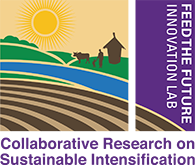Dr. Jerry Glover, Senior Sustainable Agricultural Systems Advisor for USAID Bureau for Food Security and Dr. Aliou Faye, Senior Researcher at ISRA and Senegal Country Coordinator for SIIL, discuss the millet cropping system in Senegal just north of the Gambia Border. This semi-arid region is marked by a distinct dry and rainy season with approximately 600 mm of average rainfall and highly degraded sandy soils. Agroforestry plays an important role in this millet cropping system. During the dry season, farmers’ fields are dominated by shrubs and trees which either have reverse phenology by dropping their leaves in the rainy season or are cut back prior to millet planting and provide surprising benefits to soil fertility and millet productivity. The shrubs and trees deep roots bring water to the surface through hydraulic lift, the leguminous species fix atmospheric nitrogen to improve soil fertility, falling leaves provide the soil with organic matter so nutrients are used more efficiently and made more available, and the shade of the trees in the dry season attract cattle which also contribute fertilizer in the form of manure.



